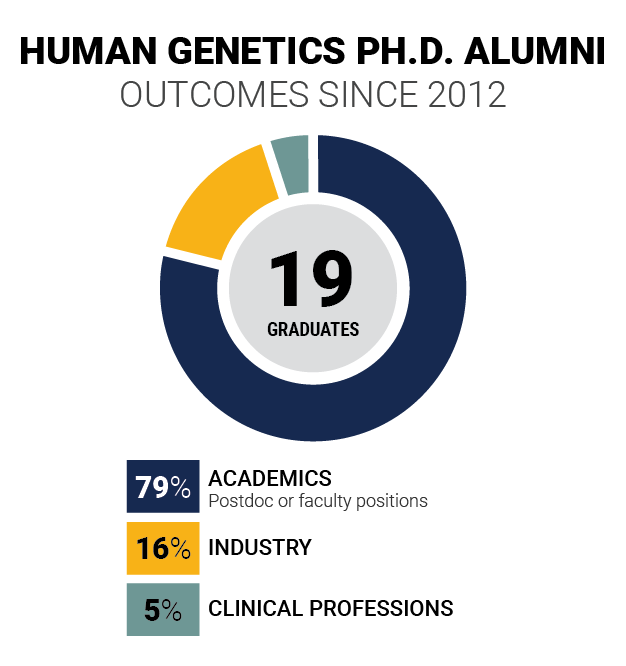As standalone programs, the M.S. in genetic counseling and Ph.D. in human genetics require 60 credits and 86 credits, respectively, thus with a minimum total of 146 graduate credit hours if completed separately. Because of the overlap between the two programs, students pursuing the dual degree must complete 117 graduate credit hours (or 119 with the quantitative human genetics concentration) to earn both degrees.

VCU’s Human Genetics Ph.D. program provides rigorous, interdisciplinary training across all aspects of human genetics and genomics.
Our faculty are committed to supporting the next generation of scientists and academics in the field, and graduates of the program have gone on to pursue successful careers in academia, government, clinical and private industry laboratories. Over the course of three to six years, doctoral students develop the ability to design, implement and interpret experimental approaches to address questions across a broad spectrum of research areas, including:
- Cancer genetics
- Clinical genetics
- Cytogenetics
- Data science
- Developmental genetics
- Genetic epidemiology
- Molecular genetics
- Psychiatric and behavioral genetics
- Quantitative genetics
- Translational research
We also offer a quantitative human genetics concentration for Ph.D. students.
Program structure
Full curriculum
Research
To advance the field of genetic counseling, our research faculty provide a strong foundation of scientific discovery for students in the dual degree program.
Clinical rotations
The genetic counseling training is designed to provide each trainee with increasingly complex case management and critical thinking opportunities throughout their time at VCU.
Frequently asked questions
Besides coursework, what exams will I have to pass?
Students in the dual degree program must pass all the required exams for the Ph.D. program, including the preliminary qualifying exam, taken after completion of the first two years, the dissertation proposal and the dissertation defense. Students will also take the two written comprehensive exams required of students in the MSGC program, which includes a written comprehensive exam after the second year and a final comprehensive exam closer to graduation.
How else will I be evaluated?
Faculty in the department conduct general progress reviews for dual degree students twice per year.
How will my clinical rotations work?
Dual degree students will complete the same variety of clinics as MSGC students, concentrated into a single year after completing the work towards their Ph.D.
What kind of research do dual degree students work on?
The department, School of Medicine and the broader university provide a wealth of research opportunities. Past and current research conducted by dual degree students includes quantitative analysis of genomic data to develop risk profiles for substance abuse disorders, identifying genomic markers for schizophrenia, functionally characterizing genes important in cancer and identifying biomarkers related to traumatic events. The field of genetic counseling is expanding in multiple directions, and there are relevant opportunities in cytogenetics, bioinformatics, psychology and other fields.
How long will it take me to graduate?
The typical length of study for non-dual degree Ph.D. students is four to five years, and the MSGC students typically earn their degrees in two years. Because of the overlap in program requirements, most dual degree program students will be expected to finish the program in five to six years. This will vary depending on the student’s specific project and laboratory funding.
What can I do when I graduate?
Our dual degree program graduates are succeeding in a wide range of areas and positions. Some have chosen to pursue further training, such as postdoctoral fellowships, while others have led international programs, provided expertise in clinical diagnostic laboratories and served in traditional patient-facing genetic counseling roles.
Resources
Supporting our students is at the core of the School of Medicine's mission. We provide a wide variety of resources to help enhance our graduate students' experience and ensure their safety, as well as resources to support our faculty.
How to apply
Prospective students must apply through the BSDP. After creating an account with the Graduate School at VCU, select "Application for all other graduate programs," then select "Biomedical sciences – undifferentiated – Doctoral Portal," before completing the application.
Application requirements
- The online application form
- Official undergraduate transcripts
- Three letters of recommendation
- A personal statement, describing the following:
- Your research or experience
- Why you are interested in the Ph.D. program
- Your main research interests
- A short list of prospective faculty mentors
- Any career plans you have
- Other information that may help us evaluate your qualifications as an Ph.D. trainee
- A copy of the financial guarantee or reward level if supported by a scholarship
After completing the online applications, documents that cannot be submitted electronically, such as official transcripts, should be mailed to the following address:
Virginia Commonwealth University
Office of Admissions
Box 843051
Richmond, Virginia 23284-3051
International application requirements
- TOEFL or IETLS scores (international and non-native English-speaking applicants only)
- Academic credentials evaluated by a service that is a member of the National Association of Credential Evaluation Services, or NACES, such as:
Application requirements for the MSGC/PhD dual degree program
Admission requirements for the dual degree program can be found at the VCU Bulletin:

Ready to get started?
Apply nowContact us
If you have any questions about the program or application requirements, please contact:
Daniel Bullard, Ph.D.
Graduate program director
daniel.bullard@vcuhealth.org